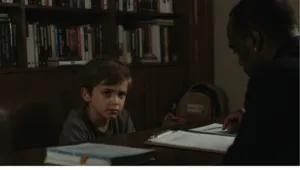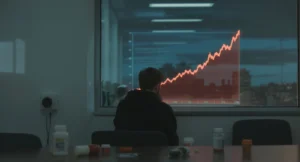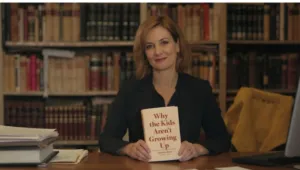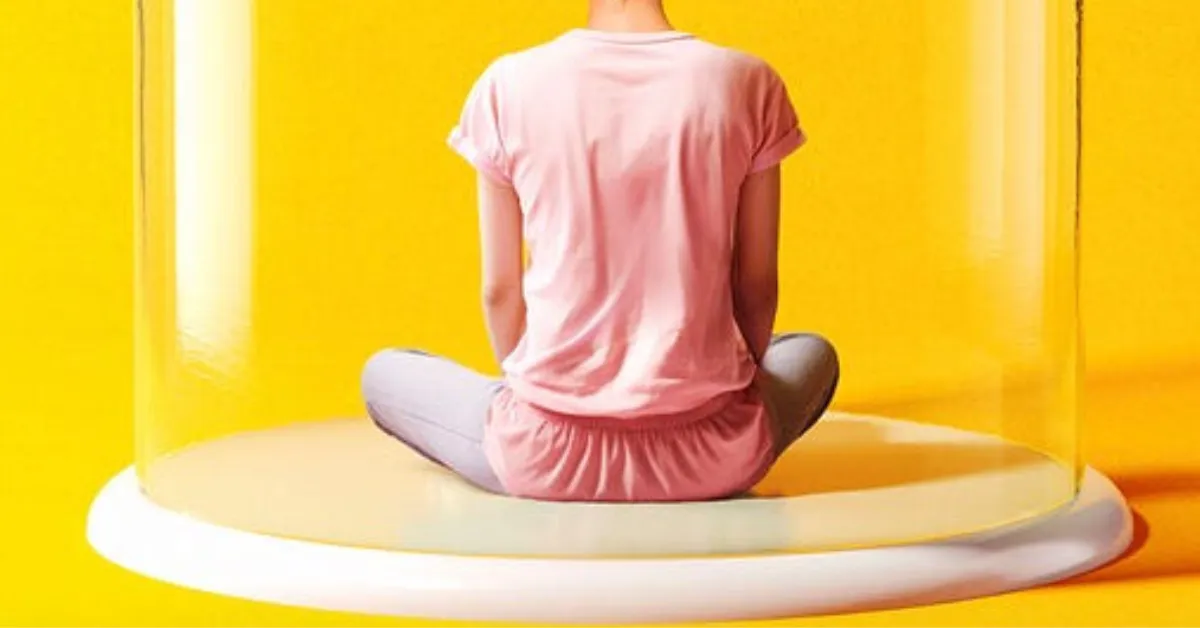Bad Therapy:WhyKids Aren’t Growing Up. In an era where nearly 40 percent of the rising generation has received treatment from a mental health professional compared to just 26 percent of Gen Xers, bestselling investigative journalist Abigail Shrier challenges the foundational assumption that the proliferation of therapeutic interventions benefits youth.
Her book examines how bad therapy, practiced not just by therapists but by teachers acting as amateur psychotherapists in schools, encourages a dangerous hyperfocus on emotional states that actually makes symptoms worse rather than building resilience and problem-solving capabilities.
Shrier asserts this pervasive approach where forty-two percent of the rising generation currently carries a mental health diagnosis and one in six US children aged two to eight years old are diagnosed with mental, behavioral, or developmental disorder has rendered what was once normal increasingly abnormal, transforming typical adolescents into permanent worriers who remain fearful, lonely, lost, and sad individuals far from the capable adults they must become.

What This Book Explores & Why It Matters
Bad Therapy: Why Kids Aren’t Growing Up. Investigative journalist Abigail Shrier’s bestselling Bad Therapy challenges conventional assumptions about the exponential growth of mental health diagnoses among children and teens, arguing that mental health experts and therapists often make normal kids with normal problems sick rather than well.
The book contends this upsurge in psychiatric diagnosis stems primarily from poorly executed mental health care that feeds anxious parents seeking answers while simultaneously minting patients faster than it can cure them, creating a mental healthcare pipeline where therapists are happy to explore what’s wrong and make money from an industry that won’t turn away the possibility of treating anyone.
Drawing on extensive research and interviews with doctors, parents, and young people, Shrier offers a novel explanation for why youth experiencing the normal pangs of adolescence are being unnecessarily diagnosed with psychiatric disorders, and examines how worried parents who think they must indulge every child’s feeling actually make matters worse.
The Mental Health Crisis: By the Numbers
Bad Therapy:Why Kids Aren’t Growing Up. Gen Z faces unprecedented challenges that previous generations never encountered on sucha scale. Youth suicide rates continue to climb at alarming rates.
At the same time, antidepressant prescriptions for children have become disturbingly common, a trend suggesting something has gone fundamentally wrong with how we approach youth wellbeing.
The proliferation of mental health care, from play therapy for kids to broader industry interventions, though lifesaving when properly applied, has paradoxically coincided with kids experiencing worse outcomes, raising questions about whether the therapists have become the exception rather than the solution to protecting our next generation.

Schools as Mental Health Providers
Bad Therapy:Why Kids Aren’t Growing Up. School has become the epicenter of children’s lives where non-therapists increasingly practice psychological interventions, often positioning educators as mental health gatekeepers rather than academic guides.
Columnist Abigail Shrier argues that this turn transforms classrooms into quasi-psychoanalysts’ couch settings, where teachers inadvertently treat normal developmental struggles as psychiatric disorders, a shift Shrier believes comes with devastating consequences that subject young minds to unnecessary clinical frameworks, from art therapy for children to other interventions, when they see everyday challenges.
The overall argument suggests that pathologizing children through counterproductive school policies has become routine, with educators acting as therapists who feed the mental health industry rather than raising emotionally resilient students capable of navigating normal childhood without clinical intervention.
The Author’s Credentials
Abigail Shrier, the journalist behind this latest book titled, Bad Therapy:WhyKids Aren’t Growing Up brings clear eyes and compassion to examine what’s happening with youth mental health care over the past 30 years.
Her remarkable work examines the marked rise in psychiatric diagnosis and asks if we feel sure about current interventions, or if the problem is bad therapy itself, preventing Kids from Growing Up into independent children.
According to her research,h packed with relatable stories and insights, she offers liberating advice and common-sense conclusions, enumerates dangerous side effects of over-treatment, and explores ways professionals might unintentionally harm rather than help.
A must-read for anyone concerned about protecting the proportion of teens affected by therapists and the rise due to therapeutic overreach, again challenging assumptions about Mental Health interventions.

Publishing Details
Bad Therapy: Why Kids Aren’t Growing Up carries a provocative title that immediately signals worse outcomes for youth today, where therapeutic culture has confinedchildhood itself.
Written with precision, the author writes that parents are most likely encountering a manufactured crisis, one shaped by professionals who claim expertise yet deliver fragility.
The 64-page opening section alone challenges what 65 years of progressive child psychology has produced, not resilience, but dependency on external validation and constant intervention.
Psychology Today’s Critical Analysis
Knowing when to put your thirteen-year-old in therapy is not simple. Take your kid to a shrink only after you’ve exhausted all other options, reserving intervention for the most serious cases. Young people are much better off without them if they’re suffering from mild anxiety or depression, particularly when obviously not helped by current mental health treatments that dominate today’s landscape.
What Readers Are Saying: Positive Reviews
Bad Therapy:Why Kids Aren’t Growing Up. Readers praised how Shrier navigates the landscape where mental health interventions have paradoxically created more dependency rather than resilience.
Many appreciate her examination of how contemporary parenting has shifted toward Psychology Today-style diagnostics, transforming parents into amateur clinicians who worry excessively about normal developmental struggles.
The book resonates particularly with those who’ve observed how therapy culture has infiltrated every aspect of childhood, from classroom dynamics to school policies, creating what one frequent contributor to educational discussions called “a generation wrapped in psychological bubble wrap.
” Several reviews highlight her journalist credentials and how she documents the transformation of ordinary kids into patients, noting that her Columbia College training in critical thinking shines through when dissecting the mental health crisis narrative.
Readers found compelling her argument that this cohort of young people faces unique challenges not from insufficient mental health professionals, but from excessive therapeutic intervention that prevents natural growing processes, a perspective that, when first published, discussions rarely explored with such directness.
Reader Concerns & Criticisms
Brilliant observers have noted how the book should serve as required reading for all parents and counselors, particularly given so many good intentions paired with so much going wrong in kids’ mental health. Critics point out too much focus on mental health issues rather than just letting children develop naturally, with few books having found the capacity to seem able to capture this terrifying trend affecting the next generation‘s lack of resilience.
What remains particularly compelling is saying the quiet part loud that therapeutic intervention saturates Anaheim, California public school systems, where educators attended professional development conference sessions instructed in trauma-informed education, learning to treat every child as a survivor of trauma, which puts great weight on a few anecdotes to buttress policies everywhere.
The very first line of clinical talk about youth, unfortunately, conflates two distinct groups: one that suffers from profound mental illness and a second, far larger cohort representing nearly 10 percent of American children receiving a diagnosis that’s double the expected prevalence rate based on population surveys from other countries, particularly diagnosed anxiety disorder cases.
The Wall Street Journal contributor holds an A.B. degree earned through the Euretta J. Kellett Fellowship, a B.Phil. from the University of Oxford. Her J.D. from Yale Law School credentials from a former opinion columnist who sued for malpractice after writes emerged showing something stupid had gone wrong, where somebody dies as a result. However, nobody seemed to be going to sue over subtler harms.
FAQs
Q: Why do critical reviews express such screams of highly problematic concerns about bad therapy for children?
A: Because generalized opinions mixed with ableist anecdotes create bias toward fear rather than helping people read with time to think through whether over-pathologizing serves or harms kids.
Q: What troubling patterns emerge when schools treat teachers as therapists without proper training?
A: Most now rely on a scholarly paper from 20 years ago that cites one study where physicians near Washington D.C. reported attention deficit hyperactivity disorder (ADHD) diagnosis suggestions, making a big leap to claim universal support for in-school mental health interventions.
Q: How does far-right nationalism intersect with shitty research in the bad therapy debate?
A: Confirm that obvious political bent shapes many criticisms, causing readers to walk away nodding heads in agreement instead of taking an objective look at mental health statistics and whether the crisis narrative serves kids’ or adult agendas.
Q: What happened with the recent California bill proposing $50 million for additional squadrons of social workers in public schools?
A: California Assembly Bill 912 would have allocated funds for hiring more workers, meaning students already received some services but were likely soon getting much more until Governor Newsom vetoed it on October 8, 2023, almost five months after initial publication.
Q: Why do ratings on platforms show a 3.96 average rating with 14,715 ratings and 2,793 reviews despite negative responses?
A: The nonfiction psychology audiobook spanning 350 pages (ebook version February 27, 2024) splits readers between those who agree with concerns about stupid therapeutic trends versus those who found the genres of self-help critiques too problematic to share.

